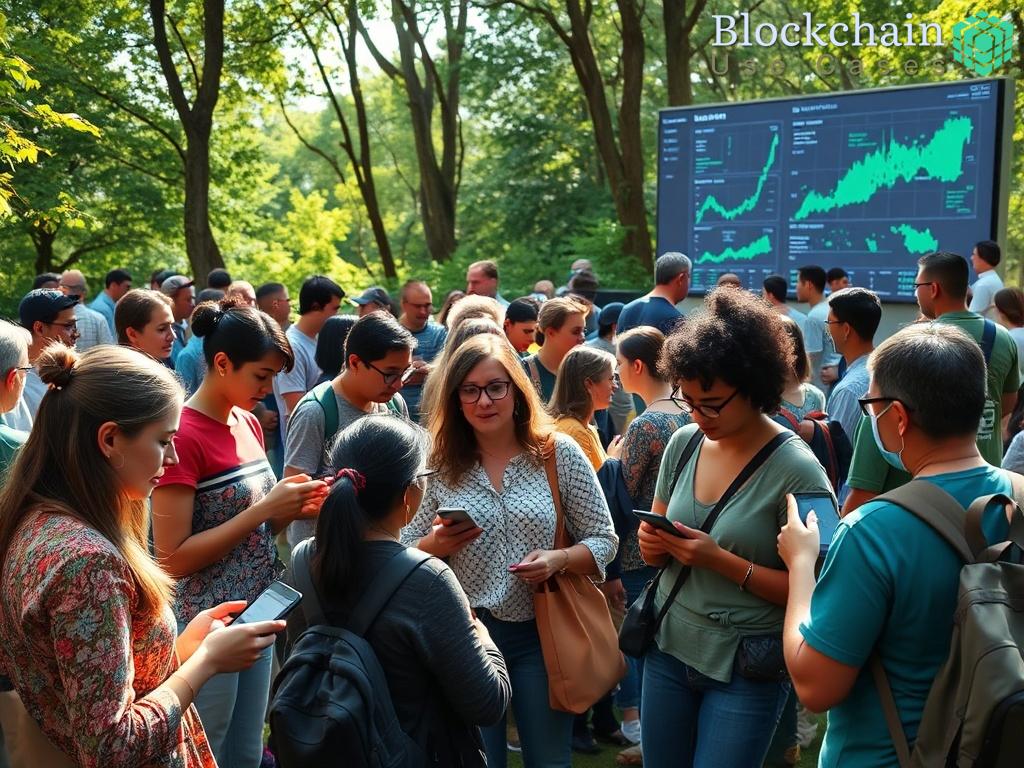Overview of Decentralized Citizen Science Platforms

Transforming Citizen Science through Decentralization
In an era where traditional scientific methods are evolving, decentralized platforms for citizen science have emerged as a revolutionary approach to data collection and community engagement. These platforms leverage blockchain technology and peer-to-peer networks to empower individuals from diverse backgrounds to contribute to scientific research. This article delves into the various decentralized citizen science platforms, highlighting their unique features, benefits, and potential challenges.
Key Characteristics of Decentralized Platforms
Decentralized citizen science platforms distinguish themselves through several key characteristics that enhance both participant engagement and data integrity. The following list outlines these essential features:
- Transparency: All activities and data transactions are recorded on a public ledger, ensuring that the entire process is open to scrutiny.
- Data Ownership: Contributors retain ownership of their data, allowing them to control how it is used and shared.
- Incentivization: Many platforms offer rewards, whether in cryptocurrency or other forms, to encourage participation and sustained engagement.
- Community Governance: Participants often have a say in platform development and decision-making processes, fostering a sense of ownership and responsibility.
- Interdisciplinary Collaboration: These platforms facilitate collaboration among scientists, amateurs, and stakeholders from various fields, promoting diverse perspectives.
Prominent Platforms Shaping the Future of Citizen Science
As the landscape of decentralized citizen science continues to expand, several platforms have emerged as frontrunners in revolutionizing how data is collected and utilized. Below is a comparison table highlighting some of the leading platforms:
| Platform Name | Core Technology | Focus Area | Unique Features |
|---|---|---|---|
| Open Science Framework | Web-based | General Research | Integration with existing projects |
| DataCollect | Blockchain | Environmental Data | Real-time data validation |
| Zooniverse | Web-based | Various Scientific Domains | User-friendly interface for all skill levels |
| Uphold | Blockchain | Health Data | Privacy-focused data sharing |
Each of these platforms offers unique tools and functionalities that cater to the needs of different research domains, ensuring that citizen scientists can contribute effectively to their chosen fields.
Technological Innovations in Data Collection
Empowering Data Collection through Cutting-Edge Technologies
The evolution of decentralized platforms for citizen science is significantly driven by technological advancements that enhance data collection processes. These innovations not only streamline the way data is gathered but also improve the accuracy and reliability of the information collected. As we explore the impact of technology on citizen science, it becomes clear how these tools have transformed traditional methodologies into a dynamic, inclusive, and efficient framework.
Smart Data Gathering Tools
In the realm of decentralized citizen science, several smart tools have emerged that facilitate easy and effective data collection. These tools are designed to harness the collective power of participants, enabling them to contribute valuable insights while ensuring that the data remains high-quality and trustworthy. Below is a list of some notable technological innovations that are reshaping data collection in citizen science:
- Mobile Applications: User-friendly apps allow individuals to collect data on-the-go, making participation accessible regardless of location.
- IoT Devices: Internet of Things technology enables real-time data collection from various environments, enhancing the breadth of research opportunities.
- Machine Learning Algorithms: These algorithms analyze large datasets, providing insights and identifying patterns that may not be immediately evident.
- Geospatial Technologies: Tools like GIS (Geographic Information Systems) offer spatial analysis capabilities, allowing researchers to visualize data in a geographical context.
- Wearable Technology: Devices such as fitness trackers and health monitors provide valuable health-related data, contributing to citizen science in the health domain.
Data Integrity and Validation Mechanisms
Ensuring data integrity is paramount in citizen science initiatives, particularly when relying on contributions from a diverse group of participants. Technological innovations have introduced robust validation mechanisms that enhance the credibility of the data collected. These mechanisms often include:
| Validation Method | Description |
|---|---|
| Blockchain Verification | Records data entries on a secure ledger, making it immutable and traceable. |
| Peer Review Systems | Involves community assessment of data quality before it is accepted for research. |
| Automated Quality Checks | Utilizes algorithms to flag inconsistencies or anomalies in the data submitted. |
These innovations not only improve the reliability of data but also foster trust among participants, encouraging further engagement in scientific research. As decentralized platforms continue to evolve, the integration of such technologies is essential in paving the way for a more participatory and effective scientific community.
Ethical Considerations in Citizen Science Initiatives
As decentralized platforms for citizen science become increasingly prevalent, an essential conversation arises surrounding the ethical considerations inherent in these initiatives. The democratization of scientific research empowers individuals to contribute significantly to a variety of fields; however, it also necessitates a careful examination of the ethical implications tied to data collection, privacy, and participant engagement. Addressing these issues is crucial for fostering a trustworthy environment that promotes vibrant scientific inquiry while respecting contributors’ rights and concerns.
One of the most pressing ethical considerations in decentralized citizen science is data privacy. Participants often share personal information or sensitive data, which raises questions about how this information is handled, stored, and utilized. With the integration of blockchain technology, many platforms offer enhanced data security, yet the responsibility for ensuring privacy ultimately lies with both the platform operators and the contributors. Transparency in data usage policies and explicit consent mechanisms are vital in building trust and ensuring that participants are aware of how their contributions will be used.
Another significant ethical concern revolves around informed consent. Unlike traditional research settings where formal consent processes are established, decentralized platforms often lack standardized protocols for obtaining participant consent. This situation can lead to misunderstandings about the scope of participation and the implications of data sharing. It is imperative for platforms to develop clear guidelines that outline the consent process, ensuring that participants fully understand their rights and the potential consequences of their involvement. Moreover, ongoing communication throughout the research process can further enhance the ethical landscape by fostering a culture of respect and collaboration.
As citizen science initiatives grow in scale and complexity, the need for ethical collaboration becomes increasingly evident. Participants in decentralized platforms hail from diverse backgrounds and possess varying levels of expertise. This diversity, while enriching the research process, also poses challenges related to power dynamics and the equitable distribution of benefits. It is essential to cultivate an atmosphere of inclusivity where all voices are heard and valued. Platforms must actively seek input from contributors to guide decision-making processes, addressing potential biases and ensuring that the research reflects the collective interests of the community.
Furthermore, accountability is a cornerstone of ethical citizen science. With the decentralized nature of these platforms, establishing clear lines of responsibility can be complex. Participants should be informed about who is accountable for data management, analysis, and dissemination. This clarity not only enhances trust among contributors but also promotes a sense of ownership and responsibility for the collective outcomes of the research. By adopting best practices in governance, such as community-led oversight committees, platforms can bolster accountability and ensure that ethical standards are upheld.
In conclusion, the intersection of ethics and citizen science is a dynamic and evolving discourse. As decentralized platforms continue to reshape the landscape of scientific inquiry, it is essential to prioritize ethical considerations at every stage of the research process. By emphasizing data privacy, informed consent, collaboration, and accountability, these initiatives can cultivate a rich ecosystem of citizen science that not only advances knowledge but also respects and empowers all participants.
Case Studies of Successful Decentralized Projects
The emergence of decentralized platforms for citizen science has paved the way for innovative projects that harness the power of community engagement and advanced technologies. These initiatives showcase how individuals can collaboratively contribute to scientific research while maintaining data integrity and ownership. Below, we explore some notable case studies that exemplify the effectiveness of decentralized citizen science.
Several decentralized citizen science projects have made significant strides in their respective fields, demonstrating the vast potential of this innovative approach to research. Here are a few remarkable examples that have garnered attention for their unique contributions:
- eBird: This platform allows birdwatchers to submit their observations, creating a comprehensive global database of bird populations. The decentralized nature of eBird encourages participation from enthusiasts worldwide, fostering community engagement and collaboration among researchers and citizen scientists.
- Foldit: A groundbreaking project that invites players to solve complex protein folding puzzles. By leveraging the collective intelligence of gamers, Foldit has led to significant scientific discoveries, including insights into the structure of important proteins, showcasing how decentralized gaming can contribute to real-world scientific challenges.
- ReefWatch: This initiative empowers divers and snorkelers to contribute data on the health of coral reefs through a user-friendly mobile application. By decentralizing the data collection process, ReefWatch successfully engages local communities in marine conservation efforts, ensuring the sustainability of vital ecosystems.
The success of these decentralized projects illuminates key lessons for future initiatives. First, fostering community involvement is crucial for sustained engagement and data quality. Second, leveraging technology effectively can streamline data collection and enhance participant experience. Finally, as these platforms evolve, addressing ethical considerations remains paramount to ensure trust and transparency among contributors. As decentralized citizen science continues to grow, the potential for further transformative projects is immense, promising a future where scientific inquiry is truly a collective endeavor.
Future Trends in Citizen Science and Data Sharing
The landscape of citizen science is on the brink of a transformative shift, driven by the rapid advancements in technology and the growing emphasis on community-driven research. Emerging trends indicate that decentralized platforms will not only enhance data collection methods but also create new opportunities for collaboration among scientists, amateurs, and the general public. As we explore the future of citizen science and data sharing, it becomes evident that this evolution is poised to reshape the scientific inquiry process, making it more inclusive, transparent, and effective.
Revolutionizing Collaboration Through Blockchain and AI
One of the most significant trends lies in the integration of blockchain technology and artificial intelligence (AI) into decentralized platforms. By leveraging blockchain, citizen science projects can ensure data integrity and enhance transparency, allowing contributors to verify their contributions while maintaining ownership of their data. This decentralized verification process encourages broader participation, as individuals feel more secure about their privacy and data rights. Moreover, AI-driven tools will facilitate data analysis, enabling researchers to derive insights from vast datasets generated by citizen scientists with unprecedented efficiency.
Cultivating a Culture of Open Science and Data Accessibility
The future of citizen science is increasingly aligned with the principles of open science. As decentralized platforms evolve, there will be a greater push toward making scientific data accessible to everyone. This democratization of data will empower not only researchers but also local communities to utilize scientific findings in addressing real-world challenges. By encouraging a culture of sharing and collaboration, platforms can foster an environment where scientific knowledge is not confined to academia but is actively used to benefit society at large. Furthermore, this shift will promote interdisciplinary research, allowing contributions from diverse fields to converge on pressing global issues.
Enhancing Participant Engagement Through Gamification
To sustain participation and ensure high-quality data collection, future citizen science platforms will likely adopt gamification strategies. By introducing game-like elements into the research process, platforms can motivate users to engage more deeply with scientific activities. These strategies may include rewards for contributions, leaderboards to foster friendly competition, and interactive challenges that allow participants to explore scientific concepts in an engaging manner. Such innovative approaches not only enhance user experience but also cultivate a sense of community among contributors, reinforcing the idea that citizen science is a collaborative endeavor.
| Future Trends | Description |
|---|---|
| Blockchain Integration | Ensures data integrity and transparency, enhancing participant trust. |
| AI-Driven Analysis | Facilitates efficient data processing and insightful analytics. |
| Open Science Movement | Promotes data accessibility, empowering communities and interdisciplinary collaboration. |
| Gamification | Encourages participant engagement through rewards and interactive experiences. |
In conclusion, the future of decentralized platforms for citizen science and data sharing is bright and full of potential. By embracing technological advancements, fostering a culture of openness, and enhancing participant engagement, these platforms are set to revolutionize the way we approach scientific inquiry. As we move forward, it is crucial for stakeholders to remain committed to ethical considerations and community involvement, ensuring that the benefits of this evolution are shared equitably among all contributors.





